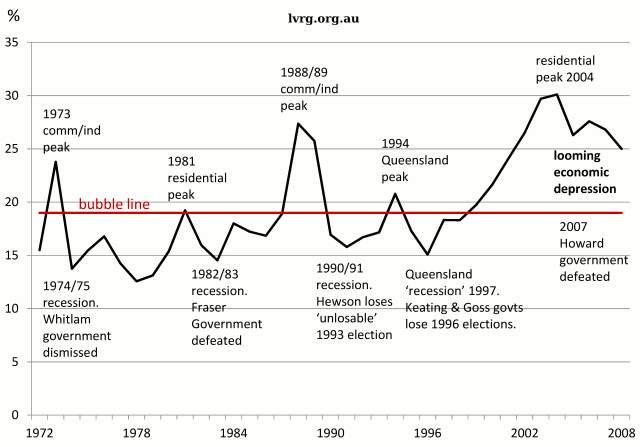The importance of a formula
Bryan Kavanagh uses the ‘D’ word.*
The formula
P = R + W + I
is more important to humanity than E=mc2, but only a few people understand its ramifications.
It shows that poverty is man-made, as are “business” cycles, economic recessions, and the economic depression that our political leaders dutifully say we are not about to have. (They prefer to lie, to “maintain confidence” rather than to solve the economy's great structural weakness.) The little equation mocks their efforts to “run” the economy. It demonstrates the manner in which planet-friendly economic activity is currently suppressed in favour of the promotion of land monopoly, speculation, urban sprawl and environmental pollution.
It's all in the formula, whose implications also remain undiscovered by modern economists. Were they to understand it, and governments to act on it, the results would be akin to the discovery of new continents. Monetary theorists, too, might well contemplate its import in respect of lending and interest.
It is economics' distributional formula: production (P) is distributed between the factor incomes rent (R), wages (W) and interest (I), as the respective returns to land, labour and capital. Whereas wages and interest are both costs of production, rent is a community-generated surplus in the production process. But we fail to capture the surplus that simply arises from the existence of community and public infrastructure, allowing it instead to be privately expropriated, and capitalized into increasingly unaffordable land prices, and mortgages that cannot be repaid.
“The labourer is worthy of his hire,” of course, so wages ought to be the full return to labour (which combines with natural resources to create wealth), just as interest should be the full return to capital (employed by labour to create wealth more efficiently).
“Ought to be”, “should be”, but isn't. So? Let's transpose the formula as Henry George did:
P − R = W + I .
That is, production less the annual value of our natural resources leaves wages and interest. And if public revenue comes out of that annual value of natural resources, wages and interest are intact — not residual after taxes and a Medicare levy have all been summarily deducted. Thus labour and capital are left to retain their full reward.
Once we understand and act upon the ramifications of the formula by paying into the public coffer the annual value of the land and other natural resources over which we have been granted exclusive use, an ample and naturally growing fund becomes available for education, health, social welfare and public infrastructure. We would rapidly reduce household debt, close the widening poverty gap, slash fraud and crime rates and come to experience real personal and financial freedom.
Taxation destroys. The Land Values Research Group's report Unlocking the Riches of Oz concludes that since 1972 the Australian economy has been suppressed to the tune of $1 trillion by the effects of taxation (including compliance costs, inflation, asset speculation, and recessions), so that GDP should now have passed $2 trillion instead of $1 trillion. Moreover, the application of a higher charge on the use and abuse of land would help ensure that additional GDP growth is environmentally friendly.
The failure to act upon this critical formula not only escalates land prices, inflation and poverty, but also diminishes science, society and the environment. And any so-called bill of rights without a preamble concerning the responsibility to pay into the public purse the annual value of land will set the current economic travesty in concrete.
As the Treasury, the Reserve Bank, politicians, economic analysts and credit-rating agencies wrestle ineffectually with their duties, the Land Values Research Group over the last 20 years has developed an economic index which would assist their decision making. It shows the total value of all Australian real estate sales divided by GDP for each year — and accurately forecasts the direction of the economy.
Ratio of real-estate sales to GDP, for Australia.
As the rent that has not been collected for public revenue is represented by the land component of real estate sales, the index shows how the misuse of rent leads to a boom-bust economy.
It is now impossible to repay all the debt invested into inflating the recent massive residential real estate bubble. Therefore Australia faces its first economic depression of the 21st century. The LVRG's expertise over 65 years has been studying the cause and cure of economic recessions and depressions. But most economists, blinded to the implications of
P − R = W + I ,
believe that bailouts and interest-rate reductions might offer some sort of solution. They won't.
Our expert opinion? There is no solution other than urgently slashing taxes, and making up the difference in revenues from publicly-generated land values.
__________
* First published late 2008 (exact date unknown). Relocated Jan.23, 2009 (hence the header date) and Feb.17, 2009. This article originally concluded with a list of LVRG forecasts (to be updated).




